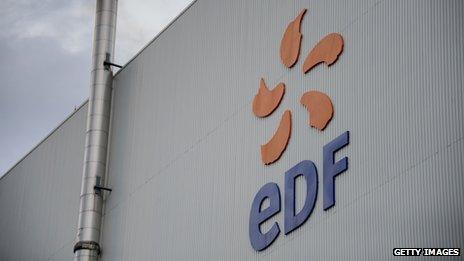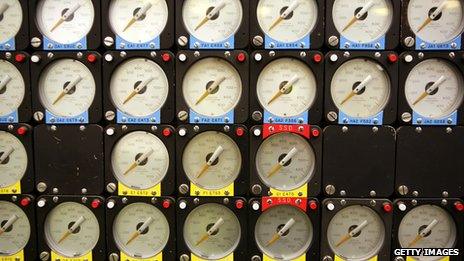What's a fair nuclear price?
- Published
- comments

Whenever I ask government officials and ministers why they are taking so long to reach a deal with EDF on building the promised vast new nuclear plant at Hinkley Point in Somerset, they say "40 years" - and turn a whiter shade of pale.
What they mean is that the French energy giant says it needs a commitment of between 35 and 40 years on the price to be paid by consumers for the power generated by Hinkley, before it presses the button on £14bn of expenditure for the two new reactors.
For officials in particular, who in theory could still be employed by taxpayers in 10 years or so, when vast amounts of electricity would start to emanate from the plant, it is a pretty scary idea that they might be committing all of us to pay more for that electricity than is justified - and not just for a few weeks or months, but till 2060.
And what they then point out is that the price originally demanded by EDF of £100 per megawatt hour was 19% higher than another source of low-carbon power - onshore wind turbines - where there is a need to guarantee the tariff for "just" 15 years.
So the gap between the price the government is prepared to offer and what EDF desires has been huge, some 25% initially, and explains why these negotiations have been running many weeks and months longer than both sides hoped and wanted.
Where are we now?
Well the gap has narrowed, but not enough. And there is a risk, although I can't scientifically quantify it, that the whole thing will collapse.
The prime minister is a bit concerned about the political fallout (no pun intended) if the project were scrapped.
Doubts would be exacerbated about the government's ability and determination to deliver on important job-creating and wealth-creating infrastructure projects. And to be clear, this is about as chunky a bit of new British kit as it is possible to imagine - 25,000 people would work on the construction and the UK would acquire valuable and exportable skills and expertise in new-generation nuclear technology.
Also the credibility of the government long-trumpeted low-carbon energy policy would be undermined, perhaps fatally.
Which is why David Cameron asked Lord Deighton, the Treasury's commercial secretary, and Stephen Lovegrove, the Energy Department's permanent secretary, to sort this mess out.
They talk to EDF, led in the UK by Vincent de Rivaz, on a daily basis.
My reading of the mood of both sides is one of cautious pessimism.

Hinkley Point: For now, the dials point to zero
If anything, it seems remarkable to me that de Rivaz has somehow prevented EDF's board from pulling the plug, given that it is spending £1m every day to keep alive the possibility of an adventure whose starting date may seem from Paris to be somewhat elusive.
That said, the calculation being made in the Treasury and Downing Street is that EDF has more to lose from the deal's collapse than the UK does - the company would have to write off more than £1bn it has already spent on the project, and its ambition to become the global player in nuclear development and operation would be damaged, and perhaps terminated.
What may concern supporters of the Hinkley project, and not just EdF, is that ministers - and especially George Osborne - seem to me to be less worried about EDF ultimately walking away than about being seen to pay too high a price for the Hinkley power.
This is how one official put it to me: "The chancellor doesn't have an ideological problem with nuclear, but he won't do a deal unless the price is right".